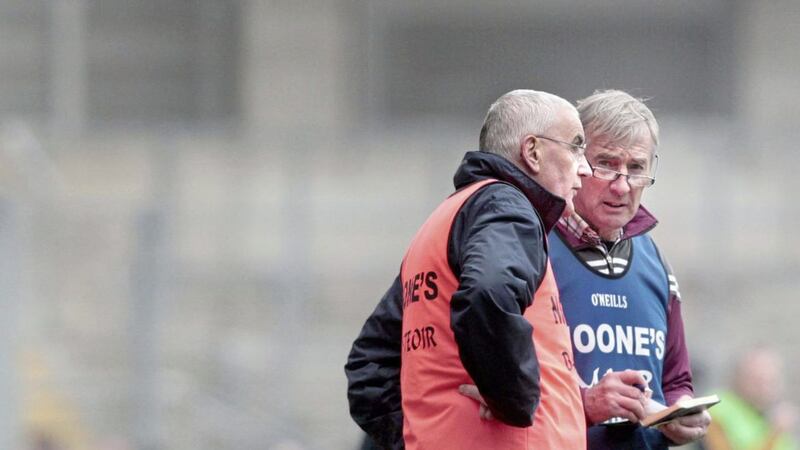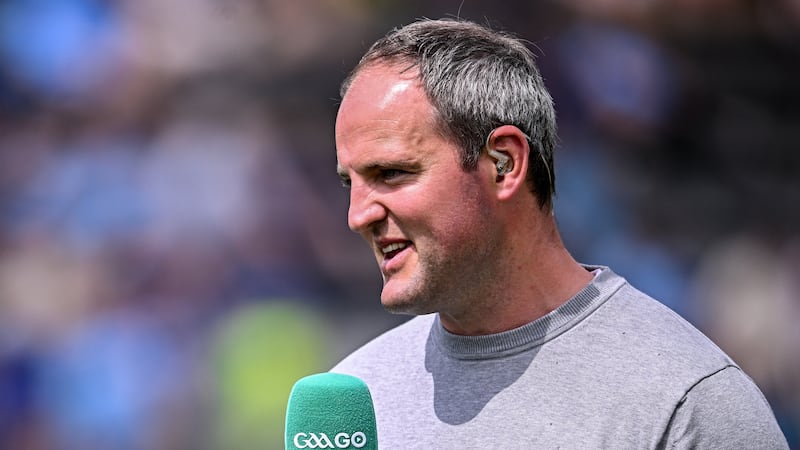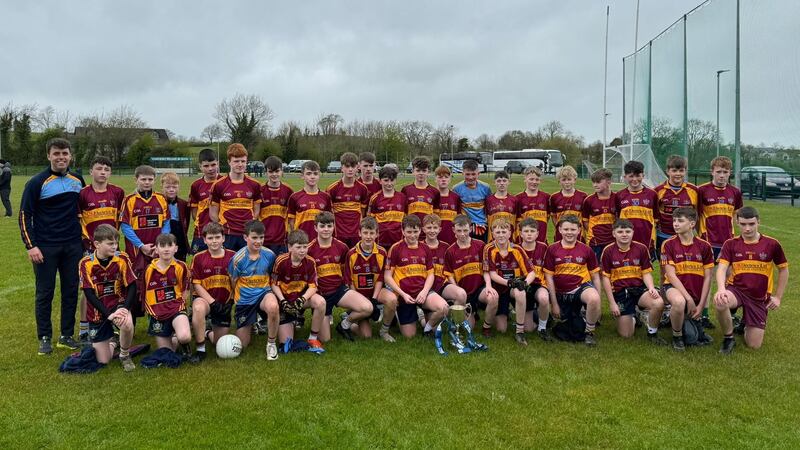YOU wouldn’t place John Joe Kearney at 70. There’s a freshness and vitality about him that was the obvious cause of the elongation of his playing days.
He was 22 when Slaughtneil reached their first county final against Bellaghy in 1969, and he finally hung the boots up at 46, turfing them aside for the last time after he played at full-forward in Slaughtneil thirds’ junior championship final loss to Ballinderry thirds in 1993.
“We drew the first day. We drew the second day. It went to extra time and we were two points up. The ball went up the field and they scored a goal.
“I played full-forward [that day]. I didn’t throw the boots away, I still have them.”
Kearney, traditionally a midfielder, was on the edge of the square with his son Brendan alongside him. At midfield on that team were club chairman Sean McGuigan and the late Thomas Cassidy.
He played senior football until he was 38 before dropping down to the reserves and eventually the thirds, where he played out the last of his days.
“I enjoyed it. Simple. There wasn't the same number of players about in them days as there are now.
“If I was this era, I wouldn’t have been playing to 36 years of age.
“When I was playing senior football, our senior team we had the bare necessities, maybe 17 players. We had a reserve team.
”I stepped down into the reserves at around 38, maybe played my last senior game in my early 40s.
“And then, when I was no use for the reserves, Big Sean collared me for the Thirds.”
A chainsaw accident almost robbed him of a finger over the winter. The digit survived, but his playing days are definitely beyond reprieve now.
“I was finishing cutting sticks for Brendan [his son] and it slid across. It happened on a Saturday and I went back to check what happened on the Sunday.
“It [the saw] was engaged but I hadn't enough revs in the saw. So she hit the timber and just snatched.
“It was a sight… The tendon was cut as well. But it was never sore.”
Now assistant manager to Mickey Moran, he carries a spring in the step that keeps him working four days a week while offering his evenings back to the club.
His enthusiasm and zest for life is reflective of a different era. When work was on the floor in Kearney’s age, there was no option to lie in the bed.
The lazy gene doesn’t exist in Slaughtneil. Be it football, hurling, camogie, community, whatever it is, the new breed are engaged and involved to the point of seven-day-a-week activity.
That smoothed the bump that he would have felt when he returned to club activity in 2014 having been invited into the backroom team by a persuasive Mickey Moran.
Kearney had taken a step back from involvement after he finished playing, with a presence over the wire as a supporter his only real contribution for “20-odd years”.
When Moran went for the job in the winter of 2012, he made his first approach to Kearney for help.
“At that time, I fell off the ladder one evening clipping a hedge at home on concrete, fractured my hip socket.
“It was the weekend before we played Bellaghy in the Championship. I struggled up the yard, maybe 100 yards to the house.
“I knew I wasn’t that well but it was Saturday evening and I wanted to see the Championship game on Sunday. I set about on Saturday evening, went to bed and said to the wife on Sunday morning I was for the chapel. The hip was very sore.
“Henry, the brother, has a van, and we got into it to go to Swatragh to watch our boys in the Championship.
“Monday morning, I knew it was bad enough to go to the hospital and they told me I had a fractured hip socket. They thought they were going to have to operate, but I lay around all day on a trolley and they did an X-ray and decided they wouldn’t operate.
“I got eight weeks’ rest. During that eight weeks, Mickey Moran came out – now this is the year he didn’t get the job – and he said he wanted me to help him out.
“I said between work and farming, I might have been saying ‘no’ to you because I don’t know if I could commit to it, and a job like that, you need to be committed.
“So that was end of story. The next year, Mickey got the job and that’s the way it ended up.”
So you had more time?
“Naw, I hadn’t any more time. I just went…”
Things had changed a lot in his absence. The structure and level of analysis of the games themselves were radically different.
But thankfully for the man who guided Derry minors to an All-Ireland title in 1989, the characteristics around Slaughtneil hadn’t altered dramatically.
“The last time I was involved in senior team management was about 20-odd years ago, you trained boys and you put the team out.
“You had no set-downs to do video analysis and make match-ups like we have nowadays. You put the team out in the best position you thought for your own players, regardless of what the other team was doing.
“I think it’s great. Mickey gets all the breakdowns down on DVDs and he does all the analysis. Between us, we’d look at it and decide ‘he’s going to him’. We agree. We’re never too far away on what the lineout should be.
“Those young boys in that squad are exceptional. There’s no messers among them. They’re treated with respect. There’s no bad language ever used along the line, we don’t believe in that.”








